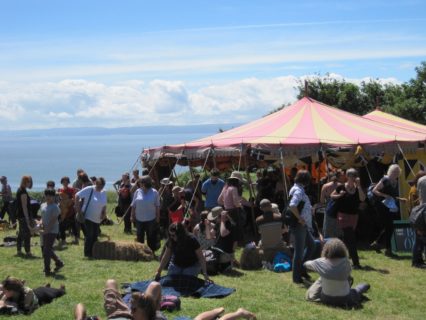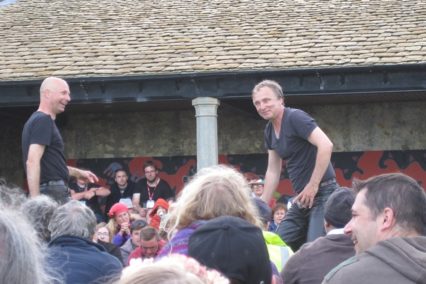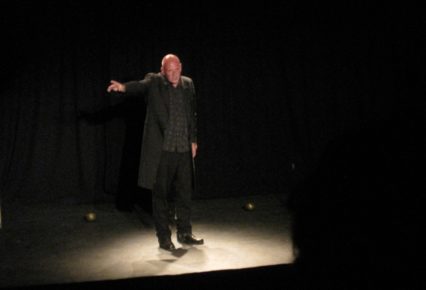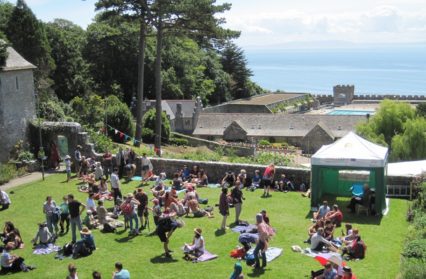Beyond the Border Storytelling Festival is all about crossing borders – from the string of fairy lights that you follow from the camp site to the festival, from the real world to the world of stories, to the border between then and now, storyteller and audience, truth and fiction. Storytelling doesn’t get much attention from the literary world, and yet it is where all literature began. Before we had writing, we told stories, and many of our most well-loved tales began with the telling.
 Wales’ international storytelling festival takes place every two years, in the idyllic coastal setting of St Donat’s Castle, and this year there were five themes threading through the events: the myths of India, Greek myths, myths of gender and transformation, tales from the blacksmith and stories from the Celtic world. The festival is for all ages, with plenty of child-friendly events, and it is also international in scope, attracting storytellers and audiences from across the globe. Most people camp, which is handy when some of the events go on past 11pm.
Wales’ international storytelling festival takes place every two years, in the idyllic coastal setting of St Donat’s Castle, and this year there were five themes threading through the events: the myths of India, Greek myths, myths of gender and transformation, tales from the blacksmith and stories from the Celtic world. The festival is for all ages, with plenty of child-friendly events, and it is also international in scope, attracting storytellers and audiences from across the globe. Most people camp, which is handy when some of the events go on past 11pm.
The highlight of the festival was an incredible epic telling of the fourth branch of the Mabinogion by Michael Harvey, accompanied by song and music from Stacey Blythe and Lynne Denman. The stage was bare apart from a few tree branches, and the story began with an imagined journey to North Wales, where the action takes place. They received a standing ovation, which was well-deserved after two hours of intense storytelling. Whenever the magician Gwydion wanted to enter a fortress, he simply disguised himself as a travelling poet, and the stories he tells as a poet come magically to life, until the listeners find themselves deep within the story, and reality disappears for a brief time. It’s an accurate description of what happens when you sit back, relax and listen to a story.
There are many different ways to tell a story, one of which is the basic format of a traditional storytelling style, with no props, costumes or instruments – just one person doing the telling, and telling it well. Ben Haggarty is a world-class storyteller who uses this method, and he showed off much skill in his telling of ‘The Blacksmith at the Bridge of Bones’, a story of magic in which a young man becomes apprenticed to an evil blacksmith who hides a strange secret.

Other highlights included Jesper La Cour Anderson and Troels Kirk Ejsing (The Telling Theatre of Denmark) telling the story of Beowulf in an intimate way, with the audience sitting close up to the marked out piece of grass which served as a stage. We joined in with the telling, and the only prop was a versatile watering can, which also served as an instrument for sound effects.
A more unusual story, ‘The Girl Who Became a Boy’, was told by Jo Blake Cave and Laura Pocket, who had last performed it four years ago. They began by explaining that Jo had had a child since then, and they couldn’t remember much of their original performance. This new telling was a re-imagining of the original tale, in which a young girl cuts her hair and becomes a soldier, and then embarks on a journey to explore her freedom, facing all sorts of amusing dilemmas along the way. It was a compelling tale, made even more so by the way in which they wove their own stories of motherhood into the mix.

The final, most magical event was in the Tithe Barn, an ancient building with two great doors on either side and a tiny tiered balcony at the back. It was warm and cosy, and Ben Haggarty was on stage, beginning with a tale of a blind man who finds a bag of eyes and a hypothetical decision, and re-telling some of the most dramatic Greek myths in all their gruesome glory.
Reflecting back over the weekend, it feels as though the festival has done its job of thoroughly restocking the imagination with stories and ideas. Some tales have merged together, while others will stay distinct for years to come. What Beyond the Border does, is it reminds us there is nothing more enjoyable than listening to a story well told.
You can read more on the festival on Rachel’s blog here.
(Images by the author).











